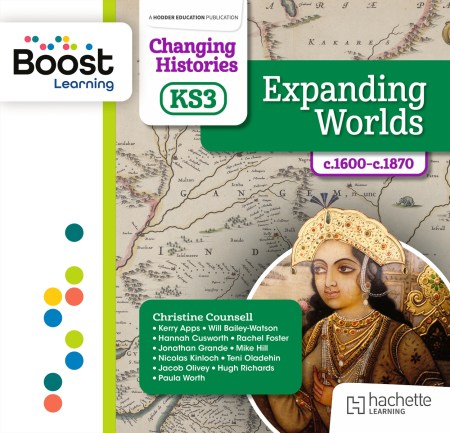Bring the worlds of Changing Histories to life with planning, teaching and assessment resources created by outstanding teachers who have been following the course in their classrooms for several years.
> Choose a route that works for you. Four course plans based around the substantive concepts of power, empire, rebellion and religion are provided. Each plan is a different length, showing how to use specific chapters from the book to build a coherent framework of knowledge in the lesson time you have available.
> Learn from the best. Every chapter is accompanied by a planning video and a teaching video, where the book authors and the Boost team discuss the thinking behind that chapter and give lots of practical, first-hand advice for lesson delivery, enquiry outcomes, scaffolding and more. A written teacher guide for every chapter covers lesson structure and activities, homework, subject knowledge and links to prior and future learning.
> Ensure high quality, high engagement lessons. Audio recordings for many chapters in the book allow pupils to hear the wonderful narratives read aloud to maximum effect. Interactive maps and sources are designed for exploration, to deepen pupils’ understanding. PowerPoints for each chapter structure your lessons and contain key vocabulary, knowledge-check questions and illustrations from the book.
> Introduce scholarship at KS3. Videos with historians featured in the book, such as Peter Frankopan and Miranda Kaufmann, offer fascinating insights into how a historian works, with accompanying worksheets for pupils. Extracts of scholarship with questions about the text are also provided, for extension or homework.
> Assess and demonstrate pupil progress. The authors share expert advice on formative and summative options for the course in an assessment guide. Automatically marked multiple-choice tests are included for every chapter and model answers with commentary for the end-of-enquiry questions in the book. Seven overarching questions facilitate summative assessment, with model answers and commentary.
> Choose a route that works for you. Four course plans based around the substantive concepts of power, empire, rebellion and religion are provided. Each plan is a different length, showing how to use specific chapters from the book to build a coherent framework of knowledge in the lesson time you have available.
> Learn from the best. Every chapter is accompanied by a planning video and a teaching video, where the book authors and the Boost team discuss the thinking behind that chapter and give lots of practical, first-hand advice for lesson delivery, enquiry outcomes, scaffolding and more. A written teacher guide for every chapter covers lesson structure and activities, homework, subject knowledge and links to prior and future learning.
> Ensure high quality, high engagement lessons. Audio recordings for many chapters in the book allow pupils to hear the wonderful narratives read aloud to maximum effect. Interactive maps and sources are designed for exploration, to deepen pupils’ understanding. PowerPoints for each chapter structure your lessons and contain key vocabulary, knowledge-check questions and illustrations from the book.
> Introduce scholarship at KS3. Videos with historians featured in the book, such as Peter Frankopan and Miranda Kaufmann, offer fascinating insights into how a historian works, with accompanying worksheets for pupils. Extracts of scholarship with questions about the text are also provided, for extension or homework.
> Assess and demonstrate pupil progress. The authors share expert advice on formative and summative options for the course in an assessment guide. Automatically marked multiple-choice tests are included for every chapter and model answers with commentary for the end-of-enquiry questions in the book. Seven overarching questions facilitate summative assessment, with model answers and commentary.
Newsletter Signup
By clicking ‘Sign Up,’ I acknowledge that I have read and agree to Hachette Book Group’s Privacy Policy and Terms of Use
